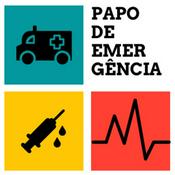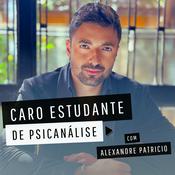92 episódios
- Send a text
Ninja Nerds!
In this episode, Rob and Zach discuss the most important clinical and pathological features of skin cancer, focusing on the three major types—basal cell carcinoma, squamous cell carcinoma, and melanoma.
We begin with basal cell carcinoma (BCC), the most common form of skin cancer, reviewing its typical appearance on sun-exposed areas, local invasiveness, and strong association with chronic UV exposure. Zach explains how to recognize key warning signs, differentiate BCC from other lesions, and understand why it rarely metastasizes despite its aggressive local behavior.
Next, we move to squamous cell carcinoma (SCC), emphasizing its connection to cumulative sun exposure, actinic keratoses, and immunosuppression. We review the classic presentation of a firm, scaly nodule or ulcer with potential for regional spread and discuss the importance of early recognition and biopsy.
The discussion concludes with a focus on melanoma, highlighting its high metastatic potential and the critical importance of early detection. We break down the ABCDE criteria for lesion evaluation, review subtypes such as superficial spreading and nodular melanoma, and explain the prognostic value of Breslow thickness in guiding management.
Each case includes the key risk factors, diagnostic findings, and treatment approaches, along with clinical pearls that reinforce the importance of prevention and early recognition. The episode ties all three cancers together into a unified framework for identifying suspicious lesions, performing timely evaluation, and improving patient outcomes.
Enjoy the episode, and please support us below!
Support the show - Send a text
Ninja Nerds!
In this episode, Rob and Zach discuss cancer screening guidelines through high-yield cases for the average-risk adult population.
We review the evidence-based recommendations for the most common malignancies, including breast, cervical, colorectal, lung, and prostate cancers, while also touching on additional screenings relevant to preventive medicine. Zach walks through each screening topic with a clear, stepwise approach that connects the pathophysiologic reasoning behind why screening matters to when it should be performed.
Each case includes the screening modality, the recommended starting and stopping ages, the screening frequency, and the key rationale behind each guideline. The discussion emphasizes how screening aims to detect disease early, reduce morbidity, and improve survival outcomes while minimizing unnecessary interventions.
This episode consolidates the essential cancer screening guidelines into a structured and practical framework, making it easy to apply in both exam preparation and clinical practice.
Enjoy the episode, and please support us below!
Support the show - Send a text
Ninja Nerds!
In this episode of the Ninja Nerd Podcast, Zach and Rob deliver a high-yield, case-based discussion on paraneoplastic syndromes, exploring how certain cancers cause systemic effects that extend beyond the primary tumor.
We begin with SIADH in small-cell lung cancer, breaking down the classic lab pattern of hyponatremia with inappropriately concentrated urine and the dangers of seizures or osmotic demyelination from overcorrection. Next, we cover ectopic ACTH production from small-cell lung cancer, reviewing the clinical features of Cushing syndrome, stepwise testing, and complications like infections, thromboembolism, and severe metabolic derangements.
The discussion moves into Lambert-Eaton myasthenic syndrome (LEMS), highlighting proximal muscle weakness that improves with activity, autonomic symptoms, and the link to voltage-gated calcium channel antibodies. We then review hypercalcemia of malignancy, focusing on PTHrP secretion by squamous lung cancers and the potential for acute kidney injury and arrhythmias.
We shift to the neurologic realm with anti-NMDA receptor encephalitis associated with ovarian teratomas, a syndrome marked by psychiatric changes, seizures, and autonomic instability that improves with tumor removal and immunotherapy. This is followed by dermatomyositis as a paraneoplastic marker for ovarian carcinoma, with its characteristic rashes, muscle weakness, and high malignancy risk.
Next, we cover myasthenia gravis linked to thymoma, emphasizing fluctuating ocular and bulbar symptoms, diagnostic testing, and the need for thymectomy in appropriate cases. Finally, we discuss Trousseau syndrome and nonbacterial thrombotic endocarditis (NBTE) in pancreatic adenocarcinoma, where migratory thrombophlebitis and unexplained clots should raise suspicion for underlying malignancy.
We conclude with a rapid wrap-up of high-yield associations:
Small-cell lung cancer: SIADH, ectopic ACTH, LEMS
Squamous cancers: PTHrP hypercalcemia
Ovarian teratoma: Anti-NMDA encephalitis
Thymoma: Myasthenia gravis
Pancreatic adenocarcinoma: Trousseau syndrome and NBTE
Enjoy the podcast, and please support us below!
Support the show - Send a text
Ninja Nerds!
In this episode of the Ninja Nerd Podcast, Zach and Rob guide you through diagnosing, staging, and management of gynecological cancers using five high-yield, case-based discussions.
We start with a 58-year-old postmenopausal woman presenting with abdominal bloating, early satiety, and weight loss. The workup, including pelvic exam, transvaginal ultrasound, and CA-125 testing, reveals advanced epithelial ovarian carcinoma with omental caking. We walk through the surgical and chemotherapeutic strategies for both confined and advanced disease, plus the role of PARP inhibitors in BRCA-positive patients, and review complications such as ascites, pleural effusion, and small-bowel obstruction.
Next, we cover a 65-year-old woman with postmenopausal bleeding and a thickened endometrial stripe on TVUS. Biopsy confirms type I endometrial adenocarcinoma. We discuss treatment pathways based on stage—from TAH-BSO for early disease to adding radiation or chemotherapy when risk increases—and highlight complications like anemia and pyometra.
The third case features a 34-year-old woman with postcoital spotting, HPV-16 positivity, and biopsy-proven invasive cervical carcinoma. We break down management options from conization for CIN 2/3 to radical hysterectomy or concurrent chemoradiation for more extensive disease. Key complications, including hydronephrosis and metastatic spread patterns, are also reviewed.
Case four presents a 62-year-old woman with vaginal spotting and malodorous discharge, leading to the diagnosis of primary vaginal squamous carcinoma. We focus on the diagnostic sequence—pelvic exam, biopsy, MRI/PET—and the role of cisplatin-based chemoradiation for localized disease.
Finally, we discuss a 72-year-old woman with chronic vulvar pruritus and an ulcerated labial lesion, diagnosed as early invasive vulvar carcinoma. We highlight the importance of biopsy for diagnosis and surgical excision for cure.
We close by emphasizing a shared approach across all cases: begin with a broad differential, select targeted diagnostics based on presentation, confirm histology, and let stage and patient factors guide treatment—all while anticipating complications.
Let’s get into it, Ninja Nerds!
Support the show - Send a text
Ninja Nerds!
In this episode of the Ninja Nerd Podcast, Zach and Rob deliver a high-yield, case-based breakdown of the most important oncologic emergencies that require rapid recognition and management.
We begin with neutropenic fever, highlighting when to suspect it, which labs to order, and why empiric IV antibiotics must be started immediately. From there, we move into tumor lysis syndrome, reviewing the hallmark lab abnormalities, urgent interventions with fluids, rasburicase, and electrolyte management, and the potential for acute renal failure.
Next, we explore spinal cord compression, a true emergency that presents with back pain, weakness, and bladder dysfunction. Zach emphasizes the importance of initiating steroids right away and consulting for surgical or radiation decompression to preserve neurologic function.
We then discuss leukostasis, a complication of acute leukemia that presents with respiratory distress, vision changes, and neurologic symptoms. Management focuses on emergent cytoreduction with hydroxyurea and leukapheresis while avoiding interventions that worsen blood viscosity.
The episode continues with cardiac tamponade, presenting with hypotension, JVD, and distant heart sounds. We review the urgent role of echocardiography, pericardiocentesis, and definitive management options.
In our sixth case, we cover hypercalcemia of malignancy, reviewing stepwise evaluation, the role of PTHrP, and treatment with IV fluids, calcitonin, and bisphosphonates, along with complications such as renal injury and arrhythmias.
Finally, we conclude with superior vena cava (SVC) syndrome, discussing key clinical features like facial swelling and venous distension, imaging findings, and management strategies including biopsy, chemoradiation, and stenting in unstable cases.
By the end of this session, you’ll have a clear, stepwise framework for approaching seven of the most time-sensitive oncologic emergencies, reinforced with clinical reasoning, red flag recognition, and immediate interventions.
Enjoy the episode, and please support us below!
Support the show
Mais podcasts de Ensino
Podcasts em tendência em Ensino
Sobre Ninja Nerd
Welcome to the official Ninja Nerd Podcast! Brought to you by Zach and Rob, we will be presenting on board exam content and highlighting the most important information you need in order to crush your exams and apply these concepts clinically.
Site de podcastOuça Ninja Nerd, Nerdologia e muitos outros podcasts de todo o mundo com o aplicativo o radio.net

Obtenha o aplicativo gratuito radio.net
- Guardar rádios e podcasts favoritos
- Transmissão via Wi-Fi ou Bluetooth
- Carplay & Android Audo compatìvel
- E ainda mais funções
Obtenha o aplicativo gratuito radio.net
- Guardar rádios e podcasts favoritos
- Transmissão via Wi-Fi ou Bluetooth
- Carplay & Android Audo compatìvel
- E ainda mais funções


Ninja Nerd
Leia o código,
baixe o aplicativo,
ouça.
baixe o aplicativo,
ouça.






































